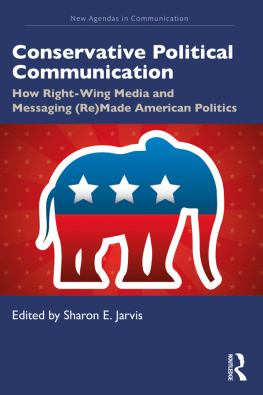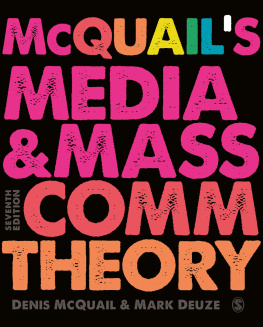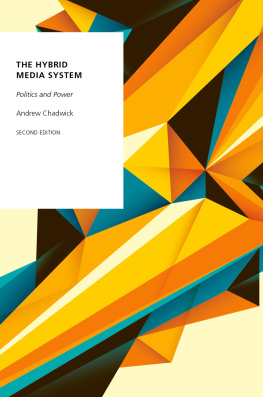Conservative Political Communication
Conservative Political Communication examines the evolution of appeals, media, and tactics in right-wing media and political communication, tracking trends and shifts from the early days of contemporary conservatism in the 1950s to the Trump administration.
The chapters in this edited volume feature the work of senior and junior scholars from the fields of communication, journalism, and political science employing content analytic, experimental, survey, historical, and rhetorical research methodologies. Analyses of the rise of the 24-hour news cycle, the range of partisan news sources, and the role of social media algorithms in political campaigns yield insights for our media and information ecosystems. A key theme across these chapters is how right-wing channels and communications help and hinder partisan fragmentation, a condition whereby novice elected officials create personal conservative brands, appeal to the base through partisan media, and complicate senior leaderships ability to engage in bargaining, compromise, and deal-making. This volume interrogates conservative media and messaging to track where these processes came from, how they functioned in the 2016 U.S. presidential campaign, and where they may be going in the future.
This book will interest scholars and upper-level students of political communication, media and politics, and political science, as well as readers invested in todays political media landscape in the United States.
Sharon E. Jarvis is Professor, Department of Communication Studies, and Associate Director of Research at the Annette Strauss Institute for Civic Life at the University of Texas at Austin. Her books include Votes That Count and Voters Who Dont: How Journalists Sideline Electoral Participation (Without Even Knowing It) (with Soo-Hye Han), Political Keywords: Using Language that Uses Us (with Roderick P. Hart, Deborah Smith-Howell, and William Jennings), and Talk of the Party: Political Labels, Symbolic Capital & American Life. Her research focuses on political language, partisan communication, and persuasion.
New Agendas in Communication
Series Editor by Karin Wilkins
A Series from Routledge and the College of Communication at the University of Texas at Austin
This series brings together groups of emerging scholars to tackle important interdisciplinary themes that demand new scholarly attention and reach broadly across the communication fields existing courses. Each volume stakes out a key area, presents original findings, and considers the long-range implications of its new agenda.
Recent series titles include:
Work Pressures
Edited by Dawna I. Ballard and Matthew S. McGlone
Digital Discussions
How Big Data Informs Political Communication
Edited by Natalie Jomini Stroud and Shannon McGregor
New Media in Times of Crisis
Edited by Keri Stephens
Conservative Political Communication
How Right-Wing Media and Messaging (Re)Made American Politics
Edited by Sharon E. Jarvis
For a full list of titles please visit: www.routledge.com/New-Agendas-in-Communication-Series/book-series/NEWAGENDAS.
First published 2021
by Routledge
52 Vanderbilt Avenue, New York, NY 10017
and by Routledge
2 Park Square, Milton Park, Abingdon, Oxon, OX14 4RN
Routledge is an imprint of the Taylor & Francis Group, an informa business
2021 Taylor & Francis
The right of Sharon E. Jarvis to be identified as the author of the editorial material, and of the authors for their individual chapters, has been asserted in accordance with sections 77 and 78 of the Copyright, Designs and Patents Act 1988.
All rights reserved. No part of this book may be reprinted or reproduced or utilised in any form or by any electronic, mechanical, or other means, now known or hereafter invented, including photocopying and recording, or in any information storage or retrieval system, without permission in writing from the publishers.
Trademark notice: Product or corporate names may be trademarks or registered trademarks, and are used only for identification and explanation without intent to infringe.
Library of Congress Cataloging-in-Publication Data
Names: Jarvis, Sharon E., 1969 editor.
Title: Conservative political communication : how right-wing media and messaging (re)made American politics / edited by Sharon E. Jarvis.
Subjects: LCSH: Communication in politicsUnited States. | Mass mediaPolitical aspectsUnited States. | Social mediaPolitical aspectsUnited States. | ConservatismUnited States.
Classification: LCC JA85.2.U6 C66 2021 (print) | LCC JA85.2.U6 (ebook) | DDC 320.973dc23
LC record available at https://lccn.loc.gov/2020047621
LC ebook record available at https://lccn.loc.gov/2020047622
ISBN: 978-0-8153-9385-6 (hbk)
ISBN: 978-0-8153-9386-3 (pbk)
ISBN: 978-1-351-18723-7 (ebk)
Typeset in Bembo
by Apex CoVantage, LLC
Jessica R. Collier earned her PhD in Communication Studies in the Department of Communication Studies at the University of Texas at Austin and is a postdoctoral research fellow at the Center for Media Engagement (CME) at the University of Texas at Austin. Her work focuses on the influence of (mis)information, digital technologies, and partisan biases on political attitudes and behaviors. Her research has appeared in Mass Communication & Society and Journalism Practice.
Bryan T. Gervais is Associate Professor in the Department of Political Science and Geography at the University of Texas at San Antonio. His research focuses on the effects of exposure to the digital messages of political elites, particularly when they are uncivil. In addition to co-authoring Reactionary Republicanism: How the Tea Party in the House Paved the Way to Trumps Victory (Oxford 2018), Gervais research has appeared in Political Psychology; Political Communication; Politics, Groups, and Identities; PS: Political Science & Politics; Social Science Quarterly; International Journal of Public Opinion Research; and Journal of Information Technology & Politics.
Matt Grossmann is Director of the Institute for Public Policy and Social Research and Professor of Political Science at the Michigan State University. His books include Asymmetric Politics: Ideological Republicans and Group Interest Democrats (with David A. Hopkins), Artists of the Possible: Governing Networks and American Policy Change Since 1945









